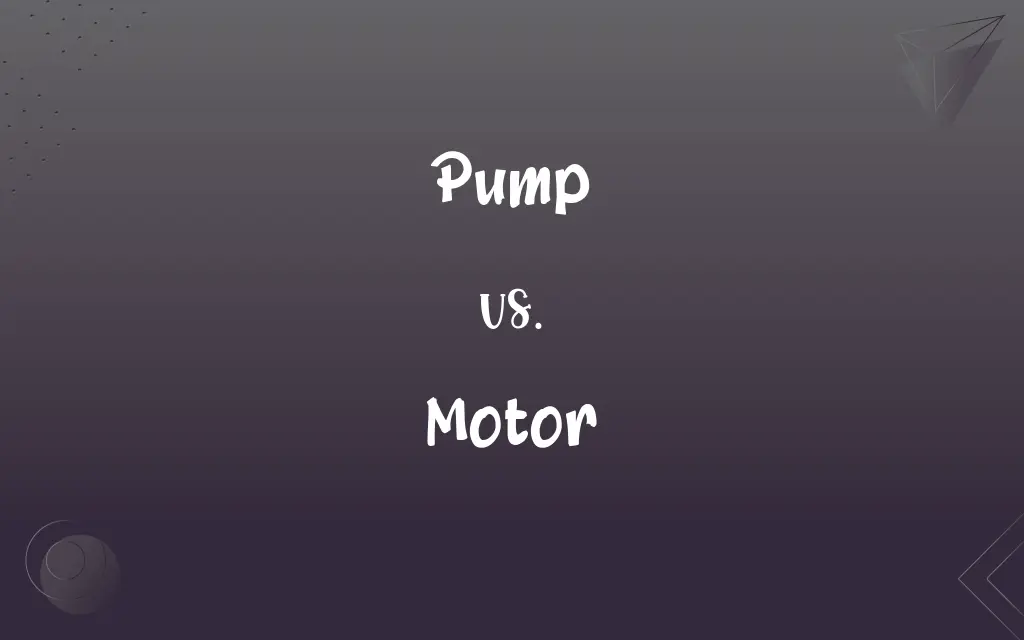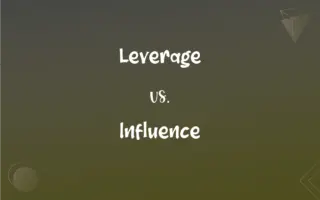Pump vs. Motor: What's the Difference?
Edited by Janet White || By Harlon Moss || Updated on November 13, 2023
A pump moves fluids; a motor converts energy into mechanical motion.

Key Differences
A pump is a device specifically designed to move fluids, either liquid or gas, from one location to another. In contrast, a motor is a machine that converts electrical, hydraulic, or other forms of energy into mechanical motion, causing movement or producing work.
Within systems, pumps rely on motors to function. The motor provides the necessary force or energy to drive the pump. Conversely, without a motor's power, a pump wouldn't have the required energy to move fluids.
The primary purpose of a pump is to create a flow or increase the pressure of a fluid, making it critical for applications such as water supply or air conditioning. On the other hand, a motor's role is more generalized, serving as a powerhouse for numerous machines, including pumps.
In terms of maintenance, pumps often require regular checks for seals, impellers, and fluid levels to ensure efficient operation. Meanwhile, motors need inspections for wear and tear, lubrication, and electrical components.
Essentially, while pumps and motors are interdependent in many systems, they have distinct functions. Pumps specialize in fluid movement, while motors are the driving force behind many mechanical systems, including those that utilize pumps.
ADVERTISEMENT
Comparison Chart
Primary Function
Moves fluids
Converts energy into mechanical motion
Dependence
Relies on motors for operation
Can power various machines, including pumps
Applications
Water supply, air conditioning
Various machinery, vehicles
Maintenance Needs
Seals, impellers, fluid levels
Wear and tear, lubrication, electrical components
Component in Systems
Fluid movement component
Powerhouse or driving force
ADVERTISEMENT
Pump and Motor Definitions
Pump
A pump is a device for moving fluids.
The water pump ensures a consistent supply to the house.
Motor
A motor is the driving force behind machinery.
The fan's motor ensures constant airflow.
Pump
A pump creates flow or pressure in a fluid.
The fuel pump feeds gasoline to the engine.
Motor
A motor converts energy into mechanical movement.
The toy's motor spins the wheels.
Pump
A pump is machinery for fluid transfer.
The aquarium uses a small pump for water circulation.
Motor
A motor uses electricity, fuel, or other energy to produce motion.
The car's motor roared to life.
Pump
A pump displaces a volume by physical or mechanical action.
The heart acts as a natural pump for blood.
Motor
A motor is a machine supplying motive power.
The washing machine's motor drives the spinning drum.
Pump
A pump is equipment that draws or forces liquid or gas to flow.
The sump pump prevents basement flooding.
Motor
A motor initiates and maintains motion in systems.
The conveyor belt relies on a powerful motor.
Pump
A machine or device for raising, compressing, or transferring fluids.
Motor
Something, such as a machine or an engine, that produces or imparts motion.
Pump
(Physiology)A molecular mechanism for the active transport of ions or molecules across a cell membrane.
Motor
A device that converts any form of energy into mechanical energy, especially an internal-combustion engine or an arrangement of coils and magnets that converts electric current into mechanical power.
Pump
(Physics)Electromagnetic radiation used to raise atoms or molecules to a higher energy level.
FAQs
How does a motor work?
A motor converts forms of energy, like electricity, into mechanical motion.
Can a pump operate without a motor?
Typically, pumps rely on motors for the energy to move fluids.
What is a pump's primary function?
A pump's primary function is to move fluids, either liquid or gas.
Where might you find a motor?
Motors are in machines, vehicles, appliances, and various equipment.
How do pumps increase fluid pressure?
Pumps use mechanical action to displace fluids, increasing their pressure.
What powers a motor?
Motors can be powered by electricity, fuels, or other energy sources.
What are some applications of pumps?
Pumps are used in water supply, air conditioning, and fuel transfer, among others.
Do all pumps need motors?
While most modern pumps use motors, manual pumps like hand pumps don't require one.
What's a common type of pump in homes?
A common household pump is the water pump, supplying water to the home.
Can motors be found in vehicles?
Yes, vehicles have motors or engines that power their movement.
Is a heart considered a pump?
Yes, the heart is a natural pump, circulating blood throughout the body.
Do pumps always require external power sources?
While many pumps need external power, some, like manual hand pumps, rely on human force.
What maintenance does a motor typically need?
Motors often need checks for wear and tear, lubrication, and electrical components.
Are pumps and motors used in industrial settings?
Yes, both pumps and motors are essential in various industrial processes and systems.
How does a motor differ from an engine?
While both produce motion, motors typically run on electricity, while engines burn fuel.
Are motors only electrical?
No, motors can be electrical, hydraulic, pneumatic, or based on other energy sources.
How long can a motor run?
A motor's run-time depends on its design, power source, and the application.
Can a pump move both liquids and gases?
Yes, pumps can be designed to move either liquids or gases.
What's the role of a motor in a pump system?
In a pump system, the motor provides the necessary energy to drive the pump.
How do pumps and motors work together?
In many systems, motors supply the energy or force required for pumps to move fluids.
About Author
Written by
Harlon MossHarlon is a seasoned quality moderator and accomplished content writer for Difference Wiki. An alumnus of the prestigious University of California, he earned his degree in Computer Science. Leveraging his academic background, Harlon brings a meticulous and informed perspective to his work, ensuring content accuracy and excellence.
Edited by
Janet WhiteJanet White has been an esteemed writer and blogger for Difference Wiki. Holding a Master's degree in Science and Medical Journalism from the prestigious Boston University, she has consistently demonstrated her expertise and passion for her field. When she's not immersed in her work, Janet relishes her time exercising, delving into a good book, and cherishing moments with friends and family.






































































